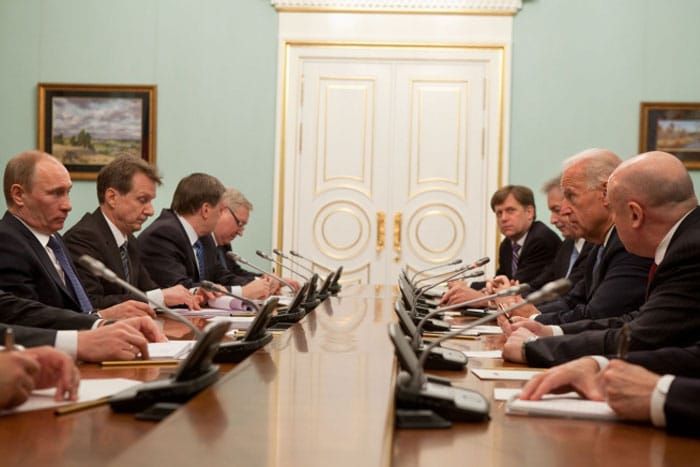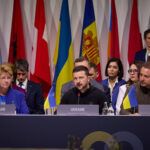Our advice to President-elect Biden: Break the dangerous pattern of nuclear competition with Russia
By Jerry Brown, William J. Perry, David Holloway | January 18, 2021
 Then-Vice President Joe Biden meets with Russian Prime Minister Vladimir Putin at the Russian White House, in Moscow, Russia, in 2011. (Official White House Photo by David Lienemann)
Then-Vice President Joe Biden meets with Russian Prime Minister Vladimir Putin at the Russian White House, in Moscow, Russia, in 2011. (Official White House Photo by David Lienemann)
Dear Mr. President-elect,
After the most bizarre presidency in US history, you are now about to take charge and begin restoring a sense of normalcy to our troubled nation. But these are anything but normal times, and your task will be enormous.
The pandemic, the brazen attempts to overturn the presidential election, and now the assault on the Capitol itself make this a period of profound uncertainty. The challenges are both domestic—getting the coronavirus vaccine distributed and the economy rejuvenated—and foreign. Trump undermined our alliances and withdrew America from hard-fought agreements such as the Paris climate accord and the Iran nuclear deal. He also repudiated important agreements with Russia. Achieving the goals set at Paris and getting the Iran deal back on track will be difficult. But the most arduous task will be putting our relations with Russia on a safer path and breaking the dangerous pattern of repeated escalation of tension between the two countries.
Russia poses the most serious threat imaginable to the United States; it could launch—possibly by mistake or miscalculation—hundreds of nuclear missiles, with absolutely catastrophic consequences. We, of course, pose a similar threat to the Russians.
While everyone knows this at some level—that an absolutely catastrophic US-Russian nuclear blunder is possible—few political leaders call for a resumption of even the level of dialogue that once existed between America and the Soviet Union. Name calling, sanctions, and outrage are the order of the day, while the older practice of serious dialogue among civilian, military, and scholarly experts is frowned upon or not widely appreciated. When there is trouble—like the recent massive intrusion into US government computer systems—the preferred US response is to punish Russia by curbing communication. This is a huge mistake.
As with the Soviet Union during the Cold War, Russia today is an essential partner in managing the global nuclear order—in spite of the hostile relations between our two countries. It was cooperation between the United States and the Soviet Union that made the 1968 Nuclear Non-Proliferation Treaty possible. More recently, Russia played a key role in negotiating and implementing the Iran Nuclear Deal.
In light of this, your announced intention to extend New START, which will otherwise expire on February 5, is absolutely the right step to take. It will enhance the predictability of our strategic relationship with Russia and provide time for negotiating new agreements or understandings with Russia—and ideally with China, too. Revival of the Iran nuclear deal is also a vitally important goal to pursue.
It’s long past time that we honestly confront the addictive and self-reinforcing quality of our current tit-for-tat relationship with Russia—one that perpetuates ever-higher nuclear spending and ever-higher levels of danger. Each nuclear ratchet upward by one country provokes a reciprocal nuclear response.
The United States must deal with Russia as it is, not as we wish it to be. This means engagement and diplomacy on the issue that threatens all of humanity. Article VI of the Nuclear Non-Proliferation Treaty requires Russia and the United States to “pursue negotiations in good faith on effective measures relating to cessation of the nuclear arms race at an early date.” Too often, and especially in recent years, we have blatantly shunned this obligation—in part, because of actions Russia has taken that we Americans find unacceptable. But that is not what the treaty permits, and it is not what makes sense.
In this current state of dismal relations, dialogue is not a reward or an exercise of naivete; it is an imperative for survival. When things are bad—as they are now—is precisely the time to talk.
Only you, Mr. President, can make that happen.
Together, we make the world safer.
The Bulletin elevates expert voices above the noise. But as an independent nonprofit organization, our operations depend on the support of readers like you. Help us continue to deliver quality journalism that holds leaders accountable. Your support of our work at any level is important. In return, we promise our coverage will be understandable, influential, vigilant, solution-oriented, and fair-minded. Together we can make a difference.
Keywords: Russia, US-Russia relations, United States, nuclear competition, nuclear weapons
Topics: Nuclear Risk, Nuclear Weapons


















Perry and Brown think the nuclear competition with Russia is the problem. Well (1) we both are supposedly limited by the new start treaty. Should the USA not build what the treaty allows? (2) Since the treaty was agreed to in 2010, the USA has deployed zero new nuclear platforms or delivery vehicles and the Russians have deployed or will deploy prior to 2026 a total of 21 new types of nuclear systems. Perry and Brown want to kill nearly two thirds of our future Triad even in the face of growing Russian nuclear threats, many of which are not… Read more »
Article VI of the Nuclear Nonproliferation Treaty also says something explicit about nuclear disarmament. It is always discouraging when prominent people from a nuclear weapons state cite Article VI, yet the word “disarmament” does not appear. Hopefully the Bulletin’s readership, largely American, knows that the key obligation imposed on Russia and the United States by Article VI is the obligation to disarm.
I thank the authors for assuming a proper perspective on Russia. The US foreign policy establishment needs to recognize that nuclear war is not another poker chip in a larger game. This chip must never be played.
Ha ha ha. It’s not Russians or any other country. It’s the people who control most industry on this planet and others. Open your eyes.